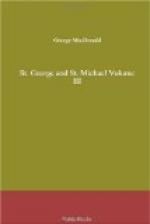She opened them with a slight start: there stood Richard a yard or two away.
He had heard of her return, and gone at once to Wyfern. There learning whither she had betaken herself, he had followed, and tracking what of her footsteps he could discover, had at length found her.
CHAPTER LVIII.
Love and no leasing.
Their eyes met in the flashes of a double sunrise. Their hands met, but the hand of each grasped the heart of the other. Two honester purer souls never looked out of their windows with meeting gaze. Had there been no bodies to divide them, they would have mingled in a rapture of faith and high content.
The desolation was gone; the desert bloomed and blossomed as the rose. To Dorothy it was for a moment as if Raglan were rebuilt; the ruin and the winter had vanished before the creative, therefore prophetic throb of the heart of love; then her eyes fell, not defeated by those of the youth, for Dorothy’s faith gave her a boldness that was lovely even against the foil of maidenly reserve, but beaten down by conscience: the words of the marquis shot like an arrow into her memory: ‘Love outlives all but leasing,’ and her eyes fell before Richard’s.
But Richard imagined that something in his look had displeased her, and was ashamed, for he had ever been, and ever would be, sensitive as a child to rebuke. Even when it was mistaken or unjust he would always find within him some ground whereon it might have alighted.
‘Forgive me, Dorothy,’ he said, supposing she had found his look presumptuous.
‘Nay, Richard,’ returned Dorothy, with her eyes fast on the ground, whence it seemed rosy mists came rising through her, ’I know no cause wherefore thou shouldst ask me to forgive thee, but I do know, although thou knowest not, good cause wherefore I should ask thee to forgive me. Richard, I will tell thee the truth, and thou wilt tell me again how I might have shunned doing amiss, and how far my lie was an evil thing.’
‘Lie, Dorothy! Thou hast never lied!’
’Hear me, Richard, first, and then judge. Thou rememberest I did tell thee that night as we talked in the field, that I had about me no missives: the word was true, but its purport was false. When I said that, thou didst hold in thy hand my comb, wherein were concealed certain papers in cipher.’
‘Oh thou cunning one!’ cried Richard, half reproachfully, half humorously, but the amusement overtopped the seriousness.
‘My heart did reproach me; but Richard, what was I to do?’
‘Wherefore did thy heart reproach thee, Dorothy?’
‘That I told a falsehood—that I told thee a falsehood, Richard.’
‘Then had it been Upstill, thou wouldst not have minded?’
’Upstill! I would never have told Upstill a falsehood. I would have beaten him first.’




